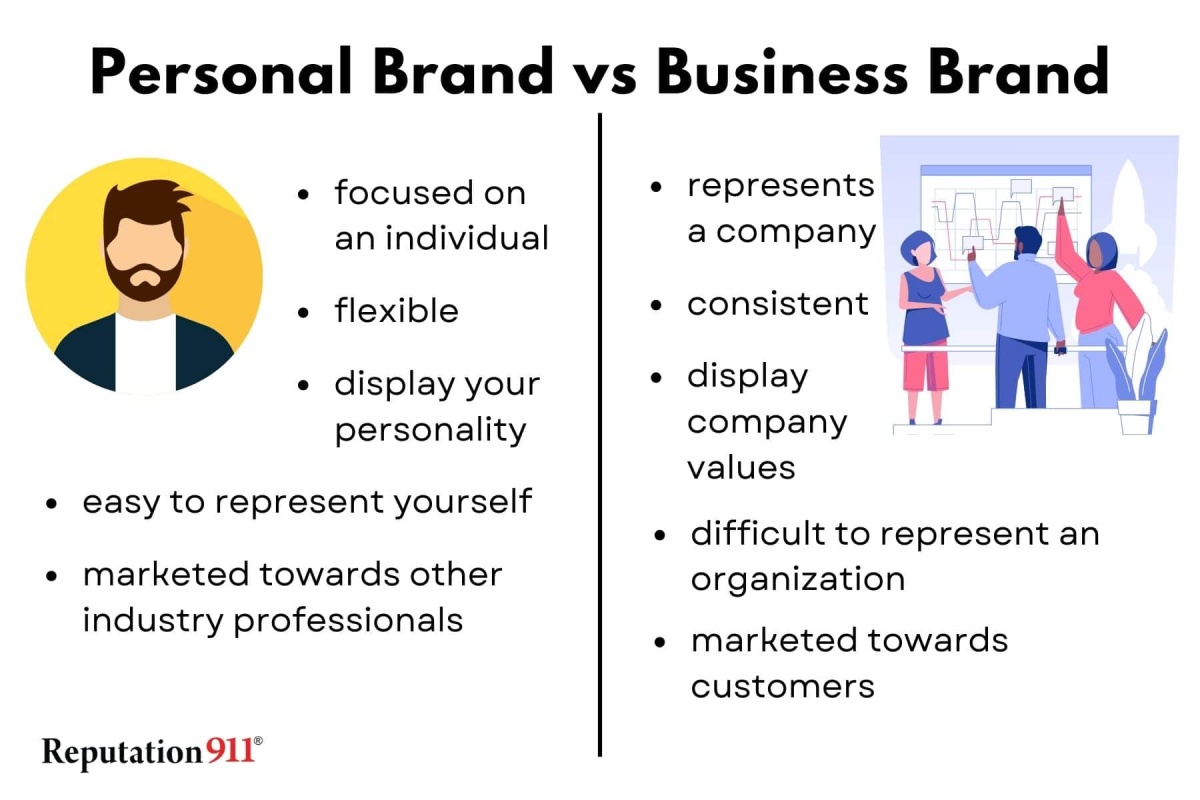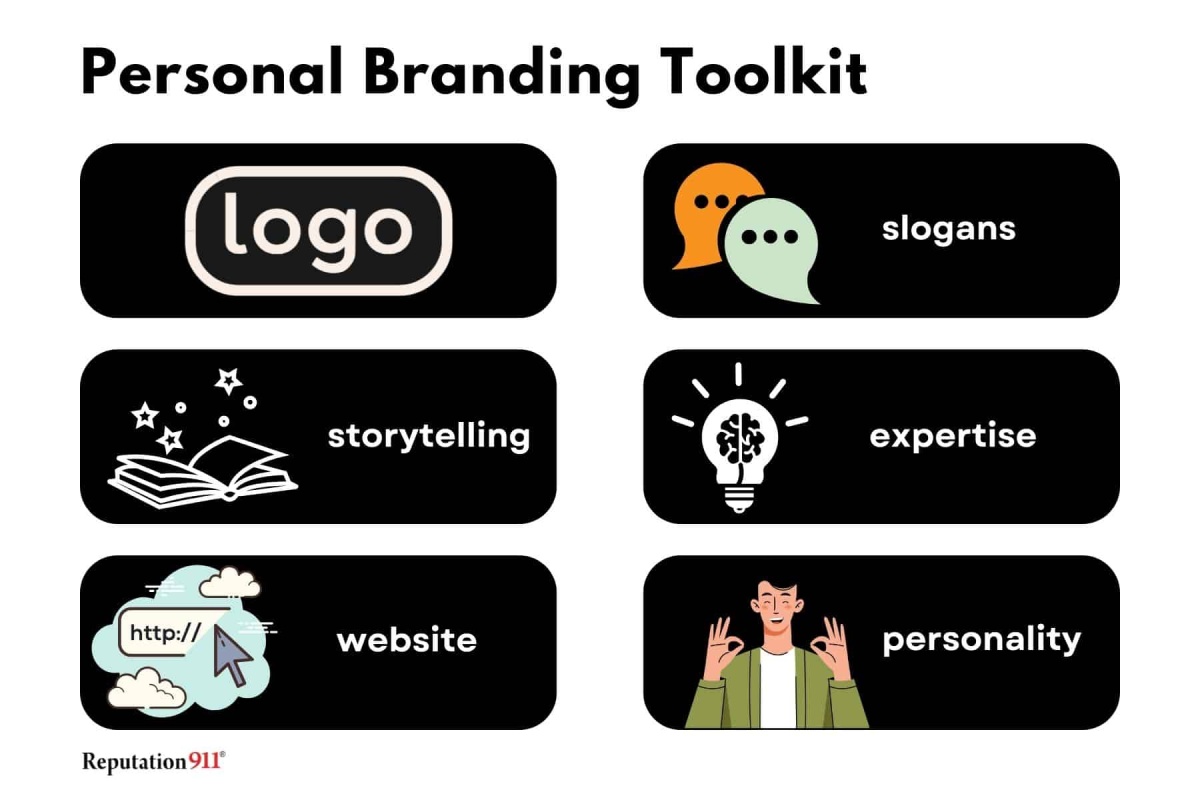Building a personal brand reputation for yourself can unlock many new opportunities to advance your career.
Consistency is everything when you build your personal brand online. Whether you’re growing a micro-niche or reworking an old product, branding gives you an advantage.
In this article, we provide personal branding tips to help you hone your online presence.
What is a Personal Brand (And Why Would I Need One)?
A personal brand is an identity that represents a person and promotes their uniqueness, credentials, and expertise. It can be beneficial for professionals who want consumers to recognize them as leaders in their fields.
Your personal brand is a significantly more intentional effort on how you want others to see you.
Who Needs a Personal Brand?
Everyone has a personal brand, it’s just a matter of displaying it online. However, personal branding is important for certain people more than others. Here are a few audiences that should invest time and resources into building their brand:
- Entrepreneurs
- Industry leaders
- CEOs
- Workers in online or tech-related industries

How is a Personal Brand Different from Business Branding?
A business brand represents a company or organization and is a separate identity from the people that work there.
A personal brand has increased flexibility to change compared to a business brand. You also get the opportunity to show off your unique personality.
You know yourself best, which is why personal branding can be quite easy. The challenging part is connecting with others in your network and building your online presence.

7 Simple Tips To Grow Your Personal Brand Online
1. Research and develop your online brand
Know yourself
Your personal branding strategy starts with you, so ask yourself some questions. What areas are you an expert or thought leader in? What inspires you, motivates you, or gives you purpose in your area of expertise? Do a deep dive into yourself and who you are, before you create content and promote yourself.
Set your goals
What goals do you want to accomplish through personal branding? Think about what information you want your people to understand about you, and what actions you want them to take.
Define your audience
Think about who you are trying to reach through your content by creating an online persona. Create a persona of your target audience based on demographic information, such as:
- Age
- Location
- Gender
- Income
- Education Level
- Occupation
- Hobbies
- Lifestyle

Get inspired
Find examples of people in your industry who use effective personal branding. What are they doing that is effective? Consider emulating strategies they are using and apply them to your own brand.
Create an action plan
This is your blueprint for developing and promoting your personal brand online. Create a formal plan to follow, and update it as needed.
2. Create your brand
Create a personal logo
A personal logo should be memorable and easy to recognize. It should either contain your name, initials, or an image related to who you are or what you do. You can use your logo on a website, business card, email signature and more.
Use storytelling to build your personal brand
Use effective storytelling to illustrate life experiences that have built and shaped you into the person you are today. This is a powerful personal branding tip when done in an authentic way.
Create a personal website
The best way to brand yourself online is to create a website. This way, you control your messaging, tone, and visuals, which allows you to communicate exactly who you are.
Test your slogans or taglines
Set up a system for your existing audience to provide feedback for slogans or taglines. Offer a small incentive for their opinion.
Outline your expertise
Mention anything that qualifies you as a thought leader, such as educational background, professional memberships, and affiliations.
Humanize yourself to your audience
You are more than your profession, so share a bit of your personal life and be authentic. Share any activities and interests you have outside work. It helps make yourself more relatable.

3. Publish content to promote your brand
Launch a personal blog
The best way to share your thoughts and insights is to create a personal blog. Enable a blogging page on your personal website, and start creating your own content.
Publish topics that are interesting to your audience
Use social media listening to see what your audience engages with on social media platforms to get a sense of similar or related topics.
Publish evergreen content

Choose topics that are relevant over time, also known as evergreen content. Rather than relying on trendy topics, this type of content is what people repeatedly search for.
Look out for trends
Trends and newsjacking are a great way to stay relevant and improve online visibility for your personal brand. This helps you stay on top of what audiences seek next.
Include strong visuals for content
Many user-friendly graphic design programs exist to create visual assets for your blogs or social media posts.
Update content to keep it fresh
If your content is outdated, do what you can to re-write and publish content with new, up-to-date information. This makes it more relevant to your users and helps to build trust and loyalty. The more relevant your content is, the higher it will appear in search engines.
Focus on tone
Content writers rely on artificial intelligence more and more these days, resulting in a lot of generic content. However, people want to read something with uniqueness and authenticity. Avoid formal or generic wording; instead, focus on sharing your authentic brand voice.
4. Utilize email marketing
Email outreach

Reach out to other industry experts via email to send them an interesting blog.
Make your branding part of your email signature
Using the color, logo, or other imagery helps build your personal brand online.
Start a newsletter
To be a thought leader, you must rely on different mediums to amplify your content. Starting a weekly or monthly newsletter is a great way to do that.

5. Create a social media marketing strategy
Connect with others on social networks
4.8 billion people use social media, with millions of users on each platform. Create social media accounts on platforms relevant to your audience.
Use the social media search functions to help find the individuals with similar interests. Reach out, introduce yourself with a personalized message explaining why you’d like to connect. LinkedIn profiles in particular are a great way to network online.
Make sure to choose a username that is aligned with your personal brand.
Use social media marketing consistently
To build your brand on social media, consistency is essential. For your audience to recognize your personal brand online, you must commit to posting quality content regularly.
Create a poll or short survey
Adding a poll to your site makes your viewers feel included and shows that you value their opinion. This can also be a great way to gather data and information about a topic.
Use memes or short quotes
Memes and short quotes are a unique yet effective personal branding tip to try. Share content that is quick and relatable, making it easily shareable.

Create a video series
Whether entertaining or informative, shareable videos capture audience attention. Video content gives you the opportunity to show off your personality while providing your thoughts and insights.
Use video platforms
Use social media sites like YouTube, TikTok, and Instagram to create long and short form video content. You can optimize your video content to appear more frequently on the apps and reach your audience.

6. Network in your industry or field
Join online communities
Communicate with others on a forum or message board to express your thoughts. Reddit has several subreddits and posts that you can contribute to. You may also find niche forums online, whether on social media (Facebook, LinkedIn) or other websites.
Attend in-person events

One of the best ways to connect with others is to attend an in-person event. Search for a few in your area, and plan to meet like-minded people.
Join online events
In-person events are fantastic, but the internet makes it possible to attend virtual events as well. This allows you to reach a much wider audience.
Become a speaker
Find opportunities to become a speaker at an event, whether in-person or online. This enables you to share your expertise and establish yourself as an authority.
Be friendly
Building a solid personal brand is all about your relationships with others. Whether meeting someone in-person or communicating online, treating others with kindness goes a long way.
Choose relatable partnerships
Finding partnerships is an often overlooked but strong personal branding tip that is extremely effective. Whether it’s a paid guest post or an affiliate relationship, make sure your audience benefits from a partnership.
Collaborate!
Find other like-minded people who have similar interests, expertise, or goals as you. Together, you can collaborate on a social media campaign, article or other project.
7. Approach your personal brand the right way
Leverage data
Social listening tools can help you understand data like impressions, traffic, and engagement of your content. Gather this data to gain insights on what’s working and what’s not, and refine your strategy.
Don’t give up
Consistency is truly the key to success, and is an important tip to keep in mind as you grow your personal brand. Audience growth doesn’t happen overnight, but persistence pays off in the long run.
Test new things online
Never stop learning how to build your personal brand online, and the strategies that work best for you. While you may be comfortable with a certain aesthetic, change keeps things fresh.
Learn new ways to build your personal brand
The key to success is embracing change and always looking forward. Learn new strategies to build your personal brand and test them. Unlike a business brand, a personal brand allows more freedom to try out various methods and tactics.
Never stop learning
Marketing and branding often work together, hand in hand. To brand yourself, you must then learn the basics of online (and offline) marketing.

What’s The Difference Between Personal Brand and Personal Reputation?
While people think these are the same, there is an important distinction between the two.
Your personal brand is a continued effort to create an image for yourself. Your reputation revolves around the opinions and beliefs that people form about you.
Using these personal branding tips can help you boost your image and web presence online. However, your reputation comes from external sources like other people, businesses, and organizations.
Do I Have Control of My Reputation?
You may think your reputation is out of your control, however, you still have options.
Taking control over your personal reputation requires a long-term strategy, and it isn’t always easy. But, there are many tactics that can help manage your reputation online.
Is Your Reputation Affecting Your Personal Brand?
When your personal brand and reputation are misaligned, there are issues. At Reputation911, we use our branding and personal reputation expertise to put you in the best light possible. Get in touch for a free reputation consultation.



